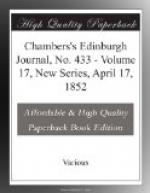Upon the whole, the best thing the humbler classes can do with small savings, is to let them accumulate as movable capital. They should perceive that, generally speaking, a little money has few advantageous outlets. It is only after its increase to a tolerable sum, that it can command a good investment. A short time ago, we adverted to the vast benefits that would accrue to the working-classes, by legalising partnerships in commandite; for this would allow the clubbing of means for trading purposes without chance of total loss. Another thing for improving the resources of such classes, would be the issue of small debentures on land, railways, and other kinds of property; these debentures to be registered in such a manner as would admit of legal recourse without the tedious and expensive forms now required to enforce their liquidation. These, then, are things to be struggled for by the humbler orders, indeed by many who ostensibly belong to classes higher in social standing.
PLEASURES OF LITERATURE.
It may be remembered, that somewhat more than two years ago, Mr Willmott’s Journal of Summer-time in the Country was noticed in these pages. Those who, through that or any other introduction, have since become acquainted with that exquisite little volume, will be glad to meet the author again, in the not less charming work which he has recently put forth, on the Pleasures, Objects, and Advantages of Literature.[4] The theme itself must be naturally attractive to all book-loving people; and we are prepared to say, that it is treated with felicity and discrimination. We do not aver that we always concur in the writer’s judgments, or hold precisely his views of criticism; but we are, upon the whole, very decidedly impressed with the general force and truth of his Discourse, with the gracefulness of his allusions and illustrations, his elegant and pointed style, and the bland and genial temper in which he writes. The work consists of a series of short chapters on books, authors, the circumstances in which they wrote, the moods in which they should be read to be appreciated, the nature and specific qualities of taste, poetry, fiction, the drama, history, and philosophy. The author’s turn of mind is chiefly retrospective: he writes more in the spirit of the last age than of the present. Indeed, he seems too much inclined to ignore the value of our later literature; almost the only modern authors




